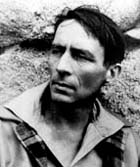Vulture Poem by Robinson Jeffers
Vulture
I had walked since dawn and lay down to rest on a bare hillside
Above the ocean. I saw through half-shut eyelids a vulture wheeling
high up in heaven,
And presently it passed again, but lower and nearer, its orbit
narrowing,
I understood then
That I was under inspection. I lay death-still and heard the flight-
feathers
Whistle above me and make their circle and come nearer.
I could see the naked red head between the great wings
Bear downward staring. I said, 'My dear bird, we are wasting time
here.
These old bones will still work; they are not for you.' But how
beautiful
he looked, gliding down
On those great sails; how beautiful he looked, veering away in the
sea-light
over the precipice. I tell you solemnly
That I was sorry to have disappointed him. To be eaten by that beak
and
become part of him, to share those wings and those eyes--
What a sublime end of one's body, what an enskyment; what a life
after death.
Amazing. I was intrigued from the beginning, because I love to watch vultures flying, but then the abrupt thought of becoming part of one by being eaten, that just blew me away!
I had my doubts at the beginning, but the imagery pulled me in and nailed me.
TODAY, again chosen as The Modern Poem Of The Day, by Poem Hunter and Team.
SIX: : The poem concludes with the speaker daydreaming about seeing with a vulture's eyes and flying with its wings, transforming death from something frightful to something promising and transcendent.
FIVE: The vulture flies away, leaving the speaker feeling remorse at the bird's disappointment in missing a meal.
FOUR: As a vulture circles overhead, the speaker engages with it, explaining that their bones still work—they are not ready for death yet.
THREE: In this single-stanza free-verse poem, the speaker describes spending a whole day wandering since dawn and now resting on a bare hillside above the ocean.
This poem has not been translated into any other language yet.
I would like to translate this poem
''What a sublime end of one's body, '' well.. not the best, maybe.. ;) - In Italian: - ''Quale sublime fine per il proprio corpo, ''